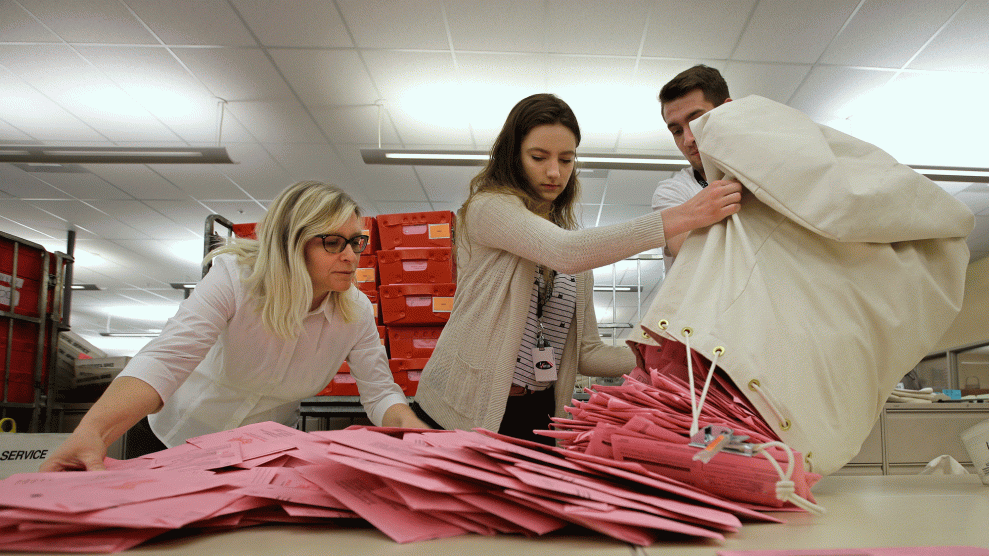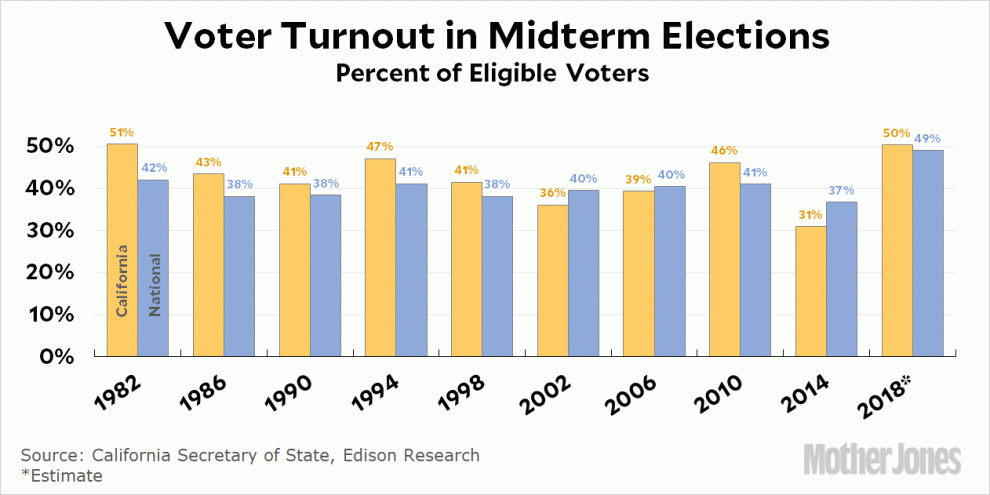
Election workers unload ballots in Sacramento, California, in June 2018.Rich Pedroncelli/AP
While Florida, Georgia, and Arizona are slowly counting (and recounting) ballots in key elections in an increasingly hysteric atmosphere , California has been quietly doing the same for nearly a week—making Democrats anxiously wait for final results from a few tight House districts they hope to flip.
Recent changes in California’s election laws, including counting mail-in ballots postmarked by election day that didn’t arrive until late last week, have slowed the process down—intentionally so. “State election law is written to maximize voters’ ability to vote and to have those votes counted,” Sam Mahood, a spokesman for the Secretary of State, told the San Francisco Chronicle. “It’s better to make sure of getting everyone’s vote counted than to speed things up.”
On Saturday night, four days after election day, the Associated Press finally announced the results in one of the most closely watched California races, determining that Democrat Harley Rouda had beaten incumbent Rep. Dana Rohrabacher. But it could be days or even Thanksgiving before other close races are officially called.
So far, Democrats have flipped 4 and lost 4 of the 10 Republican-held seats they’d targeted in the state. Here’s where all the races stand almost a week after election day:
Four seats flipped by Democrats
25th District: For a time, Republican Rep. Steve Knight, elected to Congress in 2014, was seen as California’s most vulnerable Republican. His challenger, 30-year-old Democrat Katie Hill, an executive at a nonprofit combating homelessness, was part of a wave of women seeking elected office who declared their bids on International Women’s Day. Hill won with nearly 52 percent of the vote.
48th District: Republican Rep. Dana Rohrabacher, a staunch supporter of President Trump and defender of Russian President Vladimir Putin, represented the 48th for nearly 30 years. Democrat real estate investor Harley Rouda ran a no-holds-barred campaign to unseat him and picked up 52 percent of the vote.
49th District: Rep. Darrell Issa, who represented the 49th since 2000, announced his retirement in January and threw his support behind Republican Diane Harkey, a former state assemblywoman. She went up against environmental attorney Mike Levin, who took nearly 55 percent of the vote.
10th District: Rep. Jeff Denham, the Republican incumbent who has represented this Central Valley district since 2010, went up against Democrat Josh Harder, the vice president of a Silicon Valley venture capital firm. On Tuesday night, the Associate Press called the race for Josh Harder after an updated vote count from the California Secretary of State.
Four seats Republicans held onto
4th District: Four-term Rep. Tom McClintock, considered one of California’s most conservative House members by the American Conservative Union, faced off against Democratic challenger Jessica Morse, a national security strategist. McClintock held on with 55 percent of the vote.
21st District: Rep. David Valadao, a Republican in his sixth year in Congress, has routinely won his reelection bids in the Central Valley’s House district 21, despite Democrats having an 18-point voter advantage. He faced Democratic challenger T.J. Cox, a chemical engineer. Valadao kept his seat with 51 percent of the vote.
22nd District: Embattled Rep. Devin Nunes, who has represented the 22nd district since 2003, saw his national profile soar in the past two years as he became known as President Donald Trump’s most ardent—and bumbling—defender. His Democratic challenger was 34-year-oldAndrew Janz, a Fresno prosecutor who gave Nunes the first real race of his congressional career. Still, Nunes won with 55 percent of the vote.
50th District: In August, the five-term Republican incumbent Duncan Hunter was hit with a 60-count federal indictment for a laundry list of campaign finance violations. Then he started running “the most anti-Muslim campaign in the country” against his (Christian) opponent, Ammar Campa-Najjar, a former Obama White House staffer. Hunter got 53 percent of the vote.
Two races still not called
39th District: The district’s 13-term Republican Rep. Ed Royce announced in January he would not seek reelection, paving the way for Young Kim to run against Democrat Gil Cisneros, a Navy veteran who won a $266 million lottery. Kim currently holds a 1.4-point lead over Cisneros.
45th District: Rep. Mimi Walters, the two-term Republican incumbent, has voted with Donald Trump 99 percent of time. Her challenger is bankruptcy law professor and Elizabeth Warren protégée Katie Porter. Walters holds a 1-point lead.
This article has been updated.













